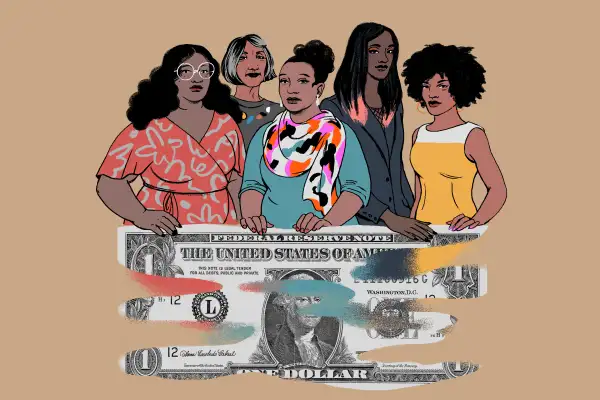Today Is Black Women’s Equal Pay Day. This Chart Shows Exactly How Big That Pay Gap Is

Today is Black Women’s Equal Pay Day, the day when Black women's salaries finally catch up to their white male counterparts'.
A typical Black woman in the U.S. makes just 62 cents for every dollar made by her non-Hispanic white male counterpart, according to an analysis of wage data from the U.S. Census Bureau, as shared in a fact sheet from the National Partnership for Women and Families. That means she's making a little over half of his salary. So if a Black woman and her male colleague both started working the same job on January 1, 2019, she would have to work until today — August 13, 2020 — in order to make as much as he did as of the end of 2019.
Put differently: She would have to do the same work for an additional eight and a half months to make the same dollar he makes.
Almost six decades after the U.S. passed the 1963 Equal Pay Act — a law that makes it illegal to pay someone less because of their gender — the average woman in the U.S. still makes 82 cents to the average man's dollar.
Gender-dominated industries, discrimination in hiring practices, the stigma around motherhood, and the hesitation many women have to ask for more money are all examples of systemic and societal issues preventing women from getting paid as much as their male colleagues. And those challenges deepen as you dive into demographics, like race.
The worse the pay gap, the further into the next year the woman would have to wait to make the same amount of money as her white male counterpart. For working moms, who make 70 cents to the dollar, that date is June 4. For Native American women and Latina women, meanwhile, Equal Pay Day doesn't come until well into the fall.
The responsibility for closing that gap largely falls to lawmakers and leaders in the workplace. But if sitting idly by isn't your cup of tea, there are certain things you can do to make sure you're making what you're worth:
First and foremost, do your research.
There are plenty of sites out there that will help you determine what you should be making, given your job or industry and years of experience. A website like Glassdoor, for example, will use information submitted by employees to create a breakdown of salaries for certain companies or job titles. It's a great practice to look before you go into an interview, but it's also a good idea to check in periodically to make sure you're being paid appropriately for a job you already have.
Once you're armed with more information, it's time to speak up. Negotiating for a higher salary is never a comfortable conversation — even if it is well-deserved — but it can be as simple as asking the right questions. Request more than you initially planned to, for example. And if you're given a number, no matter how appropriate it may seem, ask if it's the best they can do.
You could even try asking, "Is this what [insert male or white counterpart's name] is making?" It’s a tactic that worked for a yoga teacher Money interviewed just last year — she wound up making 15% more because her employer had to admit to paying a male instructor that much more than what had been offered to her.
These are just a few ways you can advocate for yourself, and potentially even cause real change for those who come after you. To learn more about the equal pay dates and the causes they represent, visit Equal Pay Today.
More from Money:
Attention, Bosses: Here's How to Design a Diversity Policy That Actually Makes a Difference
Becoming a Homeowner Isn't Easy. Here's How Three Black Families Did It
You Can Donate Unused Loyalty Points and Rewards to Support Social Justice Causes.
